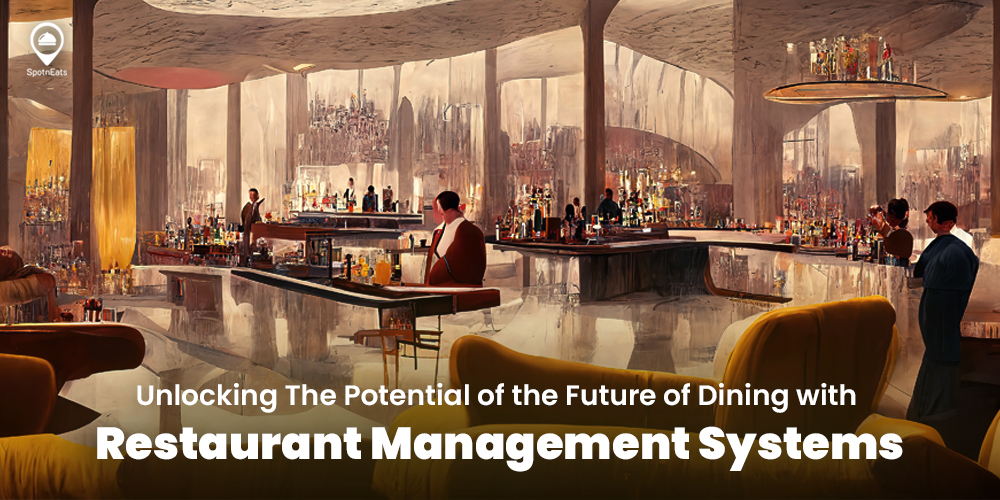
Unlocking The Potential of the Future of Dining with Restaurant Management Systems
Over the years, numerous factors, including shifts in diners’ preferences and technological advancements, have profoundly impacted the evolution of the dining experience. Consequently, the business must align with these changing trends to sustain its relevance. Recognizing this necessity, business owners actively seek tools to adapt. One such indispensable tool is a Restaurant management system.
Transitioning into the future, we foresee exciting advancements in dining technology. Furthermore, this article aims to delve into the realm of RMS, emphasizing the seamless fusion of technology with operational needs. Throughout this exploration, we will unravel the evolutionary journey, diverse types, myriad benefits, and the profound business impact of these systems.
Understanding Restaurant Management Systems
A restaurant management system (RMS) is a tool that streamlines operations, enhancing business efficiency. Moreover, it revolutionizes establishment operations, delivering exceptional dining experiences. As the backbone of restaurant management, these systems efficiently handle various activities. The software not only oversees staff management but also excels in payment processing, order and inventory management, and booking services. Recognizing the need for improved efficiency, many restaurants seamlessly integrate RMS. Consequently, customers directly experience the myriad benefits offered by this advanced tool.
Evolution of Restaurant Management Systems
Over the years, restaurant management systems have evolved significantly. Initially, they were basic systems handling transactions. Today, they encompass a broad spectrum of functionalities for restaurants. With technological advancements, RMS has experienced a vast transformation from day one to now.
Different Types of RMS
The provided list outlines key functionalities of restaurant management systems (RMS):
1. Point of Sale (POS) Integration:
This refers to the seamless integration of the POS system within the RMS. POS manages transactions, and integration ensures sales data and order processing. It provides a centralized platform for handling customer orders and payments.
2. Inventory Management:
Inventory management involves overseeing and controlling a restaurant’s stock of ingredients, supplies, and products. It helps in tracking items in real-time, minimising waste, and preventing stockouts. Inventory management is crucial for cost control and ensuring the availability of menu items.
3. Employee Scheduling:
Employee scheduling is a feature within RMS that automates the creation of work schedules for restaurant staff. It considers factors such as employee availability, labor laws, and business needs. This functionality streamlines the scheduling process, reduces errors, and ensures that the right number of staff is present during peak hours.
4. Customer Relationship Management (CRM):
CRM functionality is designed to enhance the relationship between the restaurant and its customers. It involves the collection and analysis of customer data, preferences, and interactions. This information helps in personalizing customer experiences, targeted marketing, and building customer loyalty. CRM contributes to creating a positive and lasting connection with customers.
Benefits of Implementing RMS
Implementing a robust restaurant management system brings a myriad of benefits.
- Enhanced operational efficiency
- Accurate inventory management
- Data-driven decision-making
- Improved customer service, and the advantages are far-reaching.
- Additionally, it contributes to empowering restaurant owners to make informed choices for business growth.
Industry Trends Shaping the Future of RMS
Future technology, which includes these fascinating ideas, may soon occupy the industry.
Integration of Artificial Intelligence
AI integration will be a defining feature of RMS in the future. AI-driven systems can analyze customer preferences, predict demand, and optimize menu offerings. Also contributing to the personalized and efficient service of the business.
Contactless Technology
Technologies like QR code menus and mobile payments attract tech-savvy diners. Due to the recent shift towards contactless experiences for customers.
The Impact of RMS on Small and Independent Restaurants
RMS has leveled the playing field for small and independent restaurants. These establishments can now harness the power of technology to compete in industry. From cost-effective solutions to increased visibility, RMS opens new avenues for growth. Since restaurants are a fiercely competitive industry, RMS is important.
Predictions for the Next Decade in Dining Technology
The next decade promises even more advancements in dining technology.
- AI-driven virtual assistants enhance the dining experience
- The widespread adoption of blockchain for transparent supply chain management
- The future is exciting for those at the intersection of technology and hospitality.
Conclusion
Selecting the right RMS is a critical decision for restaurant owners. Factors such as the size of the establishment, budget constraints, and specific operational needs should be considered. Conduct thorough research, ensuring a comprehensive understanding of your needs. Seek consultation with industry experts to gain valuable insights. With a clear understanding of the restaurant’s unique requirements, make an informed decision. Consequently, restaurant management systems have become indispensable tools, enabling establishments to thrive in the competitive restaurant landscape. Embracing the right system not only enhances efficiency but also propels the establishment toward a future of innovation and customer satisfaction.
Comments are closed.
